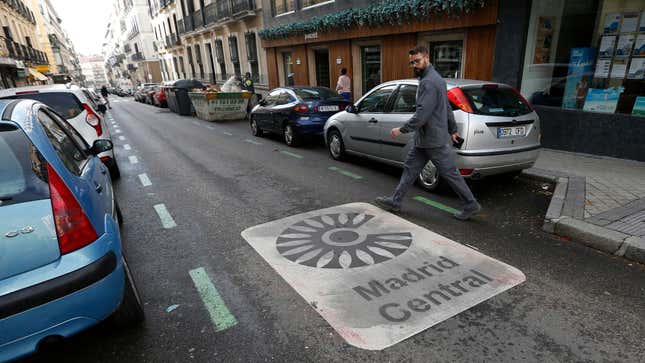
Less than a month after announcing a moratorium on Madrid’s car ban in the city center on the justification that traffic is part of the city’s identity (yes, seriously), the city’s right-wing coalition is now poised to reverse itself and go back to the ban that has been in place since December, CityLab reports. Who would have thought a pro-traffic political platform could backfire?
This reversal-of-the-reversal is particularly noteworthy because of the manner in which the backpedal happened: through upheld court challenges and mass protest. Three separate court rulings have upheld the ban as a public health measure, because, as CityLab summarized:
Barring cars from the city center was essential, the court said, “to improve the quality of the air that the citizens of Madrid breathe, which has a direct impact on health.”
Indeed, the car ban has significantly reduced pollution in the city center, just as the policy was intended.
In conjunction with the court ruling has been the mass movement in favor of the ban. Protests brought tens of thousands of Spaniards to city streets over the last month, demonstrating just how widely popular the car ban is in the Spanish capital.
It might be tempting to assume this is just a Spanish—or European—thing, and surely car bans in city centers aren’t for every city. But they are for every city with comprehensive mass transit (don’t worry, American cities outside the financial district in Manhattan, you’re nowhere close to that standard). Again, I’m going to kick it back to CityLab here because they summarized it well:
Car bans like Madrid’s offer clear, tangible improvements to citizens’ health and quality of life, and have largely gained the popular support needed to make them sustainable long-term. Authorities who seek to scrap such plans thus have to make particularly persuasive arguments, ones that need to be far more watertight than they would have been, say, a decade ago. The problem is that, in cities with proper public transit, such arguments are few or non-existent.
The most interesting part of all this is how relatively quickly the pendulum has swung. Car bans were generally regarded as extreme policy as little as a few years ago. But as case study after case study proves not only do they work but people love them, everything has changed. At least in one part of the globe, it is now considered a more extreme policy to not ban cars from dense urban centers than it is to allow them. It took us almost a century to learn cars don’t belong everywhere, and that they’re best enjoyed when everyone isn’t suffering through a highway turned into a parking lot. It’s time for that lesson to spread.